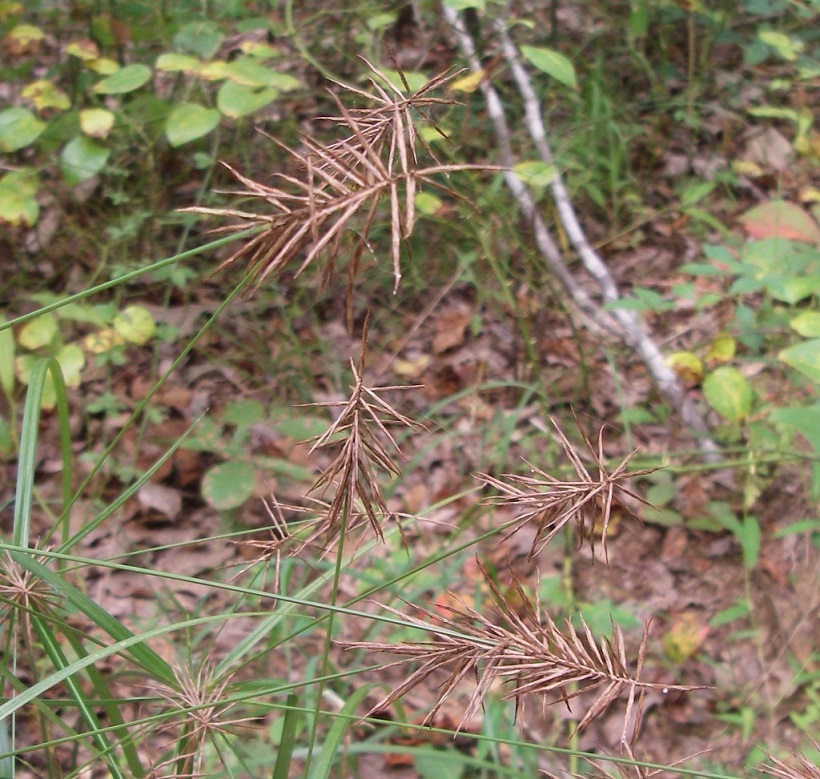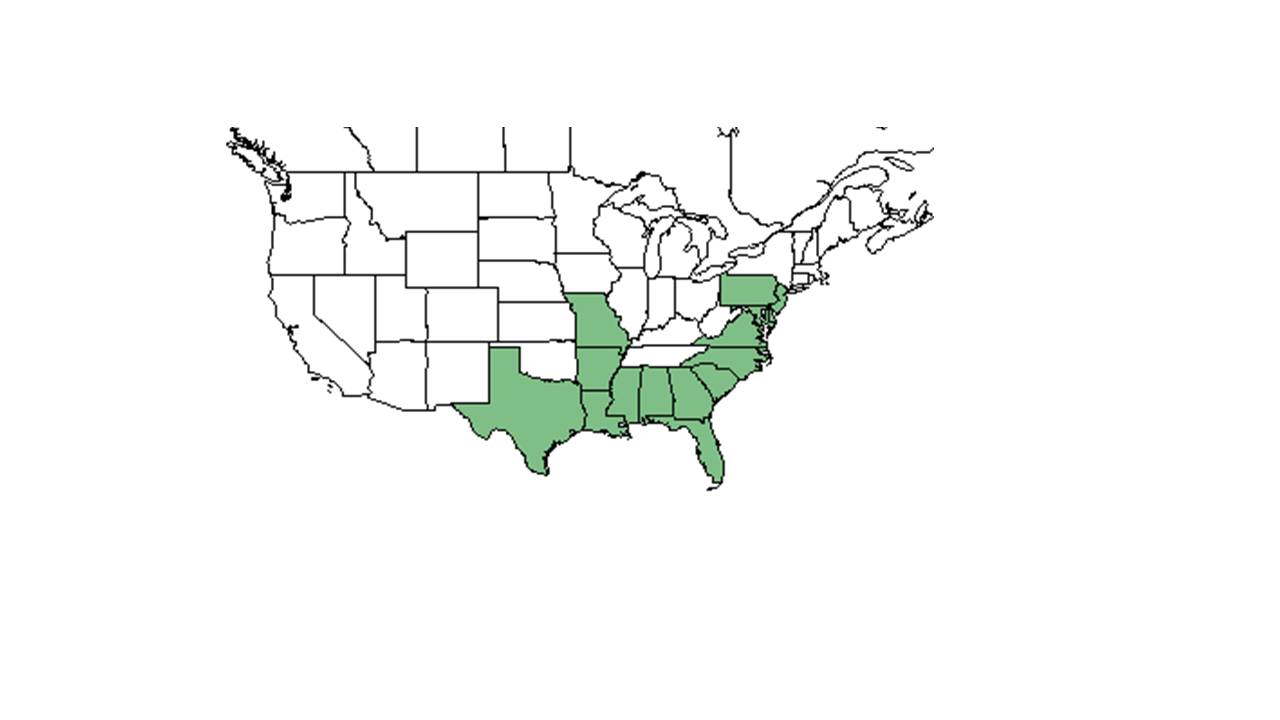Difference between revisions of "Cyperus hystricinus"
| (13 intermediate revisions by 9 users not shown) | |||
| Line 4: | Line 4: | ||
| name = Cyperus hystricinus | | name = Cyperus hystricinus | ||
| image = Cype_hyst.jpg | | image = Cype_hyst.jpg | ||
| − | | image_caption = Photo by W. A. McAvoy, 2015 | + | | image_caption = Photo by W. A. McAvoy, 2015. [http://www.wra.udel.edu/de-flora/ The Flora of Delaware Online Database] |
| regnum = Plantae | | regnum = Plantae | ||
| divisio = Magnoliophyta - Flowering plants | | divisio = Magnoliophyta - Flowering plants | ||
| classis = Liliopsida – Monocotyledons | | classis = Liliopsida – Monocotyledons | ||
| − | | ordo = | + | | ordo = Poales |
| familia = Cyperaceae | | familia = Cyperaceae | ||
| genus = ''Cyperus'' | | genus = ''Cyperus'' | ||
| Line 20: | Line 20: | ||
Common name: bristly flatsedge | Common name: bristly flatsedge | ||
==Taxonomic notes== | ==Taxonomic notes== | ||
| + | Synonyms: ''Cyperus retrofractus'' (Linnaeus) Torrey var. ''hystricinus'' (Fernald) Kükenthal<ref name=weakley>Weakley, A.S. 2020. Flora of the Southeastern United States. Edition of 20 October 2020. University of North Carolina at Chapel Hill, Chapel Hill, North Carolina.</ref> | ||
| + | |||
| + | Varieties: none<ref name=weakley/> | ||
| + | |||
==Description== | ==Description== | ||
<!-- Basic life history facts such as annual/perrenial, monoecious/dioecious, root morphology, seed type, etc. --> | <!-- Basic life history facts such as annual/perrenial, monoecious/dioecious, root morphology, seed type, etc. --> | ||
| Line 28: | Line 32: | ||
==Ecology== | ==Ecology== | ||
===Habitat=== <!--Natural communities, human disturbed habitats, topography, hydrology, soils, light, fire regime requirements for removal of competition, etc.--> | ===Habitat=== <!--Natural communities, human disturbed habitats, topography, hydrology, soils, light, fire regime requirements for removal of competition, etc.--> | ||
| − | ''C. hystricinus'' is found in sandhill communities and turkey oak-post oak-hickory-longleaf pine communities | + | ''C. hystricinus'' is found in sandhill communities and turkey oak-post oak-hickory-longleaf pine communities. <ref name= "FSU Herbarium">Florida State University Robert K. Godfrey Herbarium database. URL: [http://herbarium.bio.fsu.edu http://herbarium.bio.fsu.edu]. Last accessed: June 2014. Collectors: Loran C. Anderson, Richard Carter, and R. A. Norris. States and Counties: Florida: Okaloosa and Walton. Georgia: Coffee.</ref> It also has been found in disturbed areas, including recreation areas and near garbage dumps. <ref name= "FSU Herbarium"/> The species tends to prefer dry, sandy soils and open, sunny conditions. <ref name= "FSU Herbarium"/> |
| − | Associated species include ''Cyperus plukenetii'' | + | Associated species include ''Cyperus plukenetii''. <ref name= "FSU Herbarium"/> |
===Phenology=== <!--Timing off flowering, fruiting, seed dispersal, and environmental triggers. Cite PanFlora website if appropriate: http://www.gilnelson.com/PanFlora/ --> | ===Phenology=== <!--Timing off flowering, fruiting, seed dispersal, and environmental triggers. Cite PanFlora website if appropriate: http://www.gilnelson.com/PanFlora/ --> | ||
| − | This species has been observed flowering and fruiting in June and August | + | This species has been observed flowering and fruiting in June and August. <ref name= "FSU Herbarium"/> |
| + | <!--===Seed dispersal===--> | ||
| + | <!--===Seed bank and germination===--> | ||
| + | <!--===Fire ecology===--> <!--Fire tolerance, fire dependence, adaptive fire responses--> | ||
| + | <!--===Pollination===--> | ||
| + | <!--===Herbivory and toxicology===--> | ||
| + | <!--===Diseases and parasites===--> | ||
| + | |||
| + | ==Conservation, cultivation, and restoration== | ||
| − | == | + | ==Cultural use== |
| − | |||
| − | |||
| − | |||
| − | |||
| − | |||
| − | |||
| − | |||
==Photo Gallery== | ==Photo Gallery== | ||
| + | <gallery widths=180px> | ||
| + | </gallery> | ||
| + | |||
==References and notes== | ==References and notes== | ||
| − | |||
Latest revision as of 18:55, 23 May 2023
| Cyperus hystricinus | |
|---|---|

| |
| Photo by W. A. McAvoy, 2015. The Flora of Delaware Online Database | |
| Scientific classification | |
| Kingdom: | Plantae |
| Division: | Magnoliophyta - Flowering plants |
| Class: | Liliopsida – Monocotyledons |
| Order: | Poales |
| Family: | Cyperaceae |
| Genus: | Cyperus |
| Species: | C. hystricinus |
| Binomial name | |
| Cyperus hystricinus Fernald | |

| |
| Natural range of Cyperus hystricinus from USDA NRCS Plants Database. | |
Common name: bristly flatsedge
Contents
Taxonomic notes
Synonyms: Cyperus retrofractus (Linnaeus) Torrey var. hystricinus (Fernald) Kükenthal[1]
Varieties: none[1]
Description
A description of Cyperus hystricinus is provided in The Flora of North America. Cyperus hystricinus is a perennial graminoid.
Distribution
Ecology
Habitat
C. hystricinus is found in sandhill communities and turkey oak-post oak-hickory-longleaf pine communities. [2] It also has been found in disturbed areas, including recreation areas and near garbage dumps. [2] The species tends to prefer dry, sandy soils and open, sunny conditions. [2]
Associated species include Cyperus plukenetii. [2]
Phenology
This species has been observed flowering and fruiting in June and August. [2]
Conservation, cultivation, and restoration
Cultural use
Photo Gallery
References and notes
- ↑ 1.0 1.1 Weakley, A.S. 2020. Flora of the Southeastern United States. Edition of 20 October 2020. University of North Carolina at Chapel Hill, Chapel Hill, North Carolina.
- ↑ 2.0 2.1 2.2 2.3 2.4 Florida State University Robert K. Godfrey Herbarium database. URL: http://herbarium.bio.fsu.edu. Last accessed: June 2014. Collectors: Loran C. Anderson, Richard Carter, and R. A. Norris. States and Counties: Florida: Okaloosa and Walton. Georgia: Coffee.